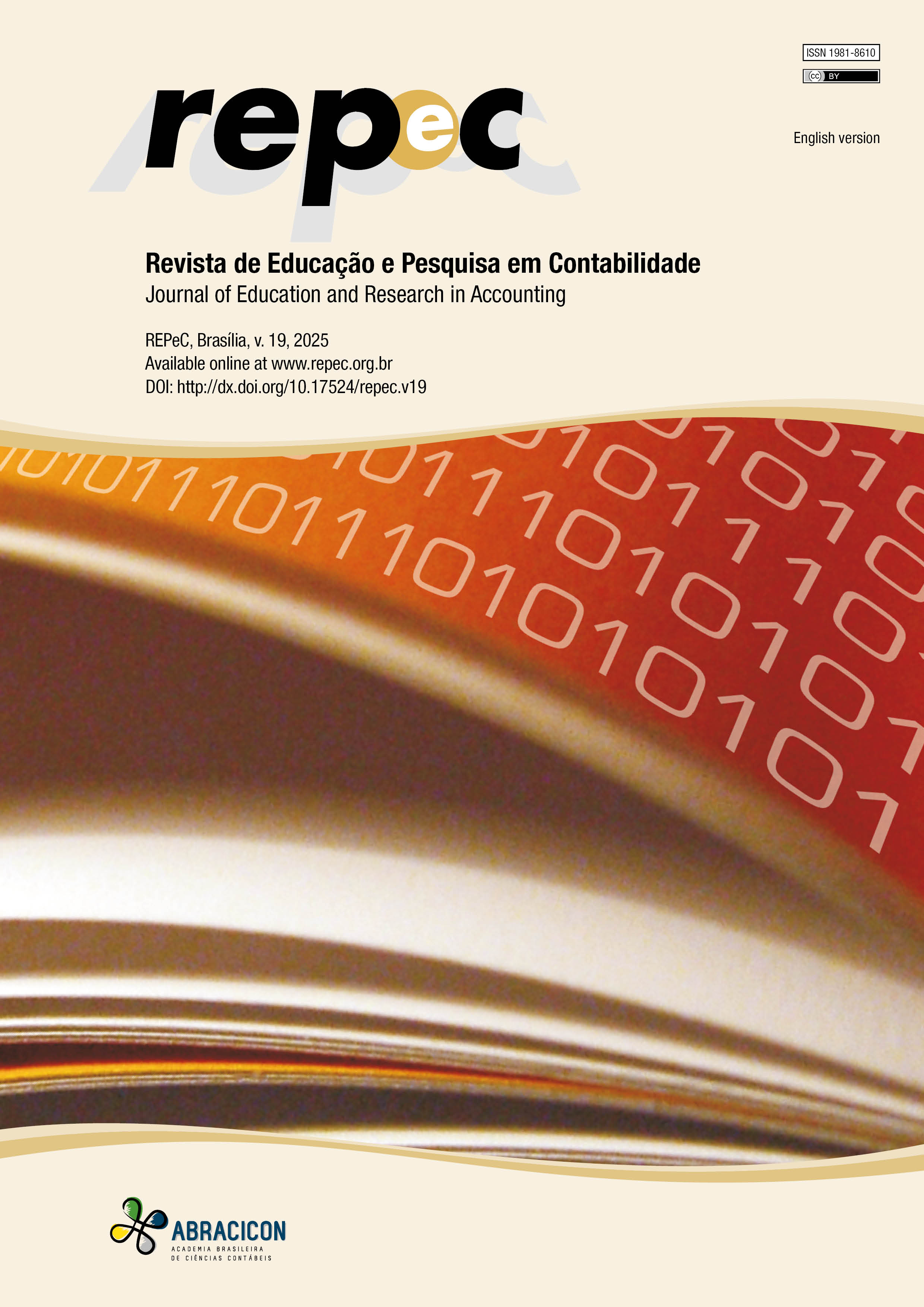Potencialidades da Modelagem de Equações Estruturais em Mínimos Quadrados Parciais (PLS-SEM), com abordagem formativa, na pesquisa contábil
DOI:
https://doi.org/10.17524/repec.v19i1.3661Keywords:
Structural Equations, Formative Approach, Accounting ResearchAbstract
Accounting research faces methodological challenges when investigating complex phenomena, often modeled by interrelated latent variables. From this perspective, Structural Equation Modeling based on Partial Least Squares (PLS-SEM) has stood out as a robust alternative to multiple regression, especially for modeling formative constructs. Unlike traditional methods, PLS-SEM allows the simultaneous estimation of direct, indirect (mediated) and moderated relationships, being particularly useful in the analysis of documentary and secondary data, widely used in financial accounting. In view of the above, this editorial explores the potential of the PLS-SEM formative approach in accounting research, highlighting applications in corporate governance, audit quality, organizational sustainability and operational efficiency. Modeling second-order constructs is discussed as a solution to capturing the complexity of these phenomena. Furthermore, the relevance of PLS-SEM is emphasized in the analysis of mediating and moderating effects, which can hardly be tested by traditional regressions. It is concluded that PLS-SEM enables more comprehensive and detailed analyzes in accounting research, providing statistically robust models and greater precision in the interpretation of results. The article contributes to the literature by highlighting the applicability of this technique and encouraging its adoption in accounting investigations.
Translations of this article
References
Bisbe, J., Batista-Foguet, J. M., & Chenhall, R. H. (2007). Defining management accounting constructs: A methodological note on the risks of conceptual misspecification. Accounting, Organizations and Society, 32(7-8), 789-820. https://doi.org/10.1016/j.aos.2006.09.010
Burke, Q. L., & Wieland, M. M. (2017). Value relevance of banks' cash flows from operations. Advances in accounting, 39, 60-78. https://doi.org/10.1016/j.adiac.2017.08.002
Diamantopoulos, A., & Winklhofer, H. M. (2001). Index construction with formative indicators: An alterna-tive to scale development. Journal of Marketing Research, 38, 269-277. https://doi.org/10.1509/jmkr.38.2.269.18845
Fitriana, T., Wulandari, A., & Kompyurini, N. (2022). Behavioral Aspects and Their Effect on The Implementation Of The Regional Financial Accounting System Of Bojonegoro Regency. Journal of Governance, Taxation and Auditing, 1(1), 28-38. https://doi.org/10.38142/jogta.v1i1.390
Gujarati, D. N., & Porter, D. C. (2011). Basic Econometrics (5th ed.). McGraw Hill Education.
Habib, A. (2004). Impact of earnings management on value‐relevance of accounting information: empirical evidence from Japan. Managerial Finance, 30(11), 1-15. https://doi.org/10.1108/03074350410769344
Hair, J. F., Black, W. C., Babin, B. J., Anderson, R. E., & Tatham, R. L. (2009). Multivariate Data Analysis (7th ed.). Pearson Prentice Hall.
Hair, J. F., Ringle, C. M., & Sarstedt, M. (2011). PLS-SEM: Indeed a silver bullet. Journal of Marketing Theory and Practice, 19(2), 139-152. https://doi.org/10.2753/MTP1069-6679190202
Henri, J.-F. (2007). Management control systems and strategy: A resource-based perspective. Accounting, Organizations and Society, 31(6), 529-558. https://doi.org/10.1016/j.aos.2005.07.001
Lee, P. A., Fayard, D., & Robinson, G. (2011). The practical guide to PLS path modeling. Behavioral Research in Accounting, 23(1), 147-175. https://doi.org/10.1016/j.accinf.2011.05.002
Mason, J., & Levy, P. (2001). Developing structural models in BAR research. Behavioral Accounting Research, 13(2), 23-39. https://doi.org/10.2308/bria.2011.23.1.1
Nascimento, J. C. H. B., & da Silva Macedo, M. A. S. (2016). Modelagem de Equações Estruturais com Mínimos Quadrados Parciais: um Exemplo da Aplicação do SmartPLS® em Pesquisas em Contabilidade. Revista de Educação e Pesquisa em Contabilidade (REPEC), 10(3). https://doi.org/10.17524/repec.v10i3.1376
Nascimento, J. C. H. B., Angotti, M., Macedo, M. A. S., & Bortolon, P. M. (2018). As relações entre governança corporativa, risco e endividamento e suas influências no desempenho financeiro e no valor de mercado de empresas brasileiras. Advances in Scientific and Applied Accounting, 166-185. https://doi.org/10.14392/ASAA.2018110109
Putra, H. G., Anita, L., & Helmy, H. (2023). The Effect of Accountability, Transparency, and Public Participation on the Performance of Public Service Organizations (Empirical Study on Investment Board and Integrated Licensing Services in West Pasaman Regency). Siber Journal of Advanced Multidisciplinary, 1(1), 35-43. https://doi.org/10.38035/sjam.v1i1.15
Qatawneh, A. M. (2023). The role of organizational culture in supporting better accounting information systems outcomes. Cogent Economics & Finance, 11(1), 2164669. https://doi.org/10.1080/23322039.2022.2164669
Shahzad, F., Rehman, I. U., Hanif, W., Asim, G. A., & Baig, M. H. (2019). The influence of financial reporting quality and audit quality on investment efficiency: Evidence from Pakistan. International Journal of Accounting & Information Management, 27(4), 600-614. https://doi.org/10.1108/IJAIM-08-2018-0097
Smith, E. (2014). Multivariate statistics for social sciences: Current challenges and solutions. Journal of Statistical Applications, 5(3), 34-46.
Smith, M., & Langfield-Smith, K. (2004). Structural Equation Modeling in Management Accounting Research. Management Accounting Review, 15(1), 45-63.
Suseno, B. D., Sugianto, E., Purnamasari, E., & Supriadi, A. (2023). Analysis of the Application of Operational Management in Manufacturing Companies in Bandung City: The Effect of Production Efficiency, Product Innovation, and Customer Satisfaction on Financial Performance. West Science Journal Economic and Entrepreneurship, 1(11), 535-546. https://doi.org/10.58812/wsjee.v1i11.354
Zhou, G., Liu, L., & Luo, S. (2022). Sustainable development, ESG performance and company market value: Mediating effect of financial performance. Business Strategy and the Environment, 31(7), 3371-3387. https://doi.org/10.1002/bse.3089
Downloads
Published
How to Cite
Issue
Section
License
Copyright (c) 2025 Journal of Education and Research in Accounting (REPeC)

This work is licensed under a Creative Commons Attribution 4.0 International License.
Authors who publish with this journal agree to the following terms:
Authors retain copyright and grant the journal right of first publication with the work simultaneously licensed under Creative Commons Attribution 3.0 Unported License, which allows the sharing of the work and recognition of authorship and its initial publication in this journal. This license allows others to distribute, remix, adapt, or create derivative works, even for commercial purposes, provided credit is given for the original creation.
b)There is no financial compensation to the authors in any capacity, for articles published in RePEc.c) The articles published in RePEc are the sole responsibility of the authors.
